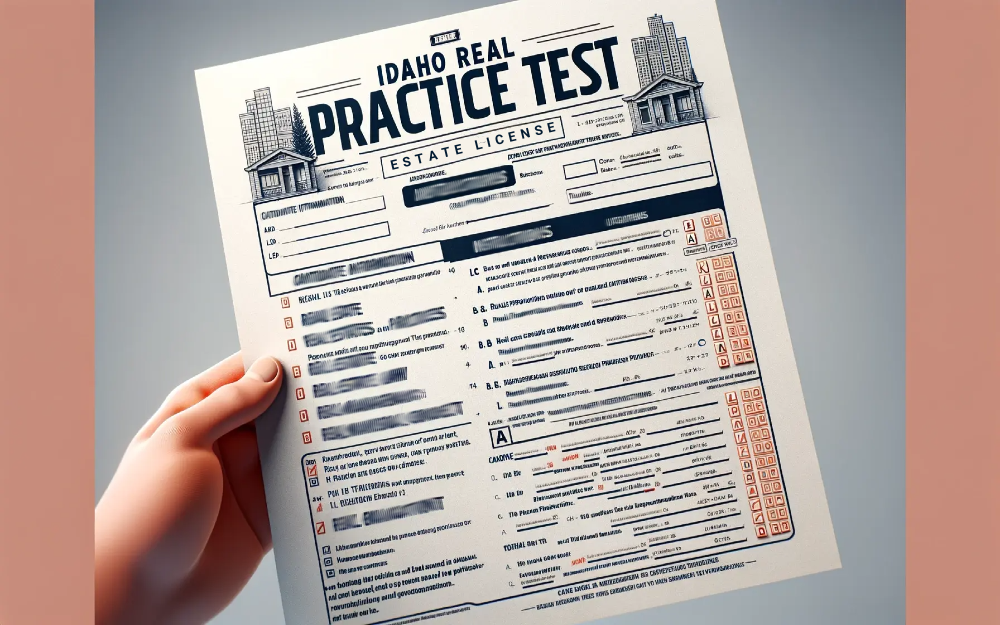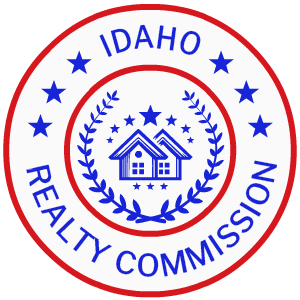
Determine your answer, then click the arrow to see the correct response.
A Seller in Idaho Refuses To Provide a Property Condition Disclosure Form. What Is the Consequence?
A) The buyer can cancel the contract without penalty
B) The seller must provide a discount to the buyer
C) The seller can be fined by the Idaho Real Estate Commission
D) The buyer can sue the seller for non-compliance
Correct Answer: A) The buyer can cancel the contract without penalty
Explanation: If the seller refuses to provide a Property Condition Disclosure form, the buyer has the right to cancel the contract without penalty.
What Is the Main Difference Between a Real Estate Broker and a Real Estate Salesperson in Idaho?
A) Brokers can own and manage real estate firms; salespersons cannot
B) Salespersons can set their own commission rates; brokers cannot
C) Brokers must disclose their commissions; salespersons do not
D) There is no difference between the two
Correct Answer: A) Brokers can own and manage real estate firms; salespersons cannot
Explanation: In Idaho, real estate brokers can own and manage real estate firms, whereas salespersons work under the supervision of a licensed broker.
A Buyer in Idaho Wants To Make an Offer on a Property but Is Unsure About the Market Value. What Should the Buyer’s Agent Do?
A) Suggest a low offer to test the seller
B) Provide the buyer with a Comparative Market Analysis (CMA)
C) Tell the buyer to offer the listing price
D) Refuse to make any suggestions
Correct Answer: B) Provide the buyer with a Comparative Market Analysis (CMA)
Explanation: The agent should provide the buyer with a Comparative Market Analysis (CMA) to help them make an informed decision about the offer price.
What Is the Purpose of the Good Funds Law in Idaho?
A) To ensure funds are available for real estate transactions before closing
B) To regulate real estate commissions
C) To protect real estate agents from fraud
D) To determine property tax rates
Correct Answer: A) To ensure funds are available for real estate transactions before closing
Explanation: The Good Funds Law requires that all funds used in a real estate transaction be verified and available before the closing to ensure a smooth and secure transfer of ownership.
In Idaho, How Long Must Real Estate Transaction Records Be Retained by the Brokerage?
A) One year
B) Two years
C) Three years
D) Five years
Correct Answer: C) Three years
Explanation: Idaho law requires that real estate transaction records be retained by the brokerage for a minimum of three years from the date of the transaction.
An Idaho Agent Is Asked To Sell a Property That Is Part of an Estate. What Document Is Typically Needed To Proceed?
A) A deed of trust
B) A court order
C) A power of attorney
D) A letter of testamentary or administration
Correct Answer: D) A letter of testamentary or administration
Explanation: To sell property that is part of an estate, an agent typically needs a letter of testamentary or administration, which authorizes the executor or administrator to act on behalf of the estate.
Which Type of Agency Relationship Is Prohibited in Idaho?
A) Buyer agency
B) Seller agency
C) Dual agency without written consent
D) Transaction brokerage
Correct Answer: C) Dual agency without written consent
Explanation: Dual agency is prohibited in Idaho unless the agent obtains written consent from both the buyer and the seller.
What Is Required for an Out-of-State Real Estate Licensee To Practice Real Estate in Idaho?
A) Nothing, as all state licenses are recognized
B) They must obtain an Idaho real estate license
C) A temporary practice permit
D) Proof of residency in Idaho
Correct Answer: B) They must obtain an Idaho real estate license
Explanation: Out-of-state real estate licensees must obtain an Idaho real estate license to legally practice real estate in Idaho.
A Real Estate Agent in Idaho Is Representing a Client Who Wants To Purchase a Rural Property. What Should the Agent Consider When Advising the Client?
A) Proximity to urban amenities
B) Zoning regulations and land use restrictions
C) Availability of public transportation
D) Historical significance of the property
Correct Answer: B) Zoning regulations and land use restrictions
Explanation: When purchasing rural property, the agent should consider zoning regulations and land use restrictions, as these can impact how the property can be used and developed.
An Idaho Real Estate Agent Receives a Referral Fee From a Mortgage Broker For Recommending Clients. Is This Practice Allowed?
A) Yes, as long as the clients are informed
B) No, it is illegal under RESPA regulations
C) Yes, if the amount is below $500
D) No, unless approved by the Idaho Real Estate Commission
Correct Answer: B) No, it is illegal under RESPA regulations
Explanation: The Real Estate Settlement Procedures Act (RESPA) prohibits real estate agents from receiving referral fees or kickbacks from mortgage brokers or other settlement service providers.
